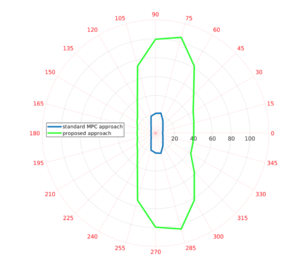Walking Control Based on Step Timing Adaptation
2020
Article
mg
Step adjustment can improve the gait robustness of biped robots; however, the adaptation of step timing is often neglected as it gives rise to nonconvex problems when optimized over several footsteps. In this article, we argue that it is not necessary to optimize walking over several steps to ensure gait viability and show that it is sufficient to merely select the next step timing and location. Using this insight, we propose a novel walking pattern generator that optimally selects step location and timing at every control cycle. Our approach is computationally simple compared to standard approaches in the literature, yet guarantees that any viable state will remain viable in the future. We propose a swing foot adaptation strategy and integrate the pattern generator with an inverse dynamics controller that does not explicitly control the center of mass nor the foot center of pressure. This is particularly useful for biped robots with limited control authority over their foot center of pressure, such as robots with point feet or passive ankles. Extensive simulations on a humanoid robot with passive ankles demonstrate the capabilities of the approach in various walking situations, including external pushes and foot slippage, and emphasize the importance of step timing adaptation to stabilize walking.
| Author(s): | Majid Khadiv and Alexander Herzog and S. Ali A. Moosavian and Ludovic Righetti |
| Journal: | IEEE Transactions on Robotics |
| Volume: | 36 |
| Number (issue): | 3 |
| Pages: | 629--643 |
| Year: | 2020 |
| Month: | June |
| Publisher: | IEEE |
| Department(s): | Movement Generation and Control |
| Bibtex Type: | Article (article) |
| Paper Type: | Journal |
| DOI: | 10.1109/TRO.2020.2982584 |
| State: | Published |
| URL: | https://ieeexplore.ieee.org/abstract/document/9082021 |
| Links: |
|
| Attachments: |
|
|
BibTex @article{khadiv2020walking,
title = {Walking Control Based on Step Timing Adaptation},
author = {Khadiv, Majid and Herzog, Alexander and Moosavian, S. Ali A. and Righetti, Ludovic},
journal = {IEEE Transactions on Robotics},
volume = {36},
number = {3},
pages = {629--643},
publisher = {IEEE},
month = jun,
year = {2020},
doi = {10.1109/TRO.2020.2982584},
url = {https://ieeexplore.ieee.org/abstract/document/9082021},
month_numeric = {6}
}
|
|




